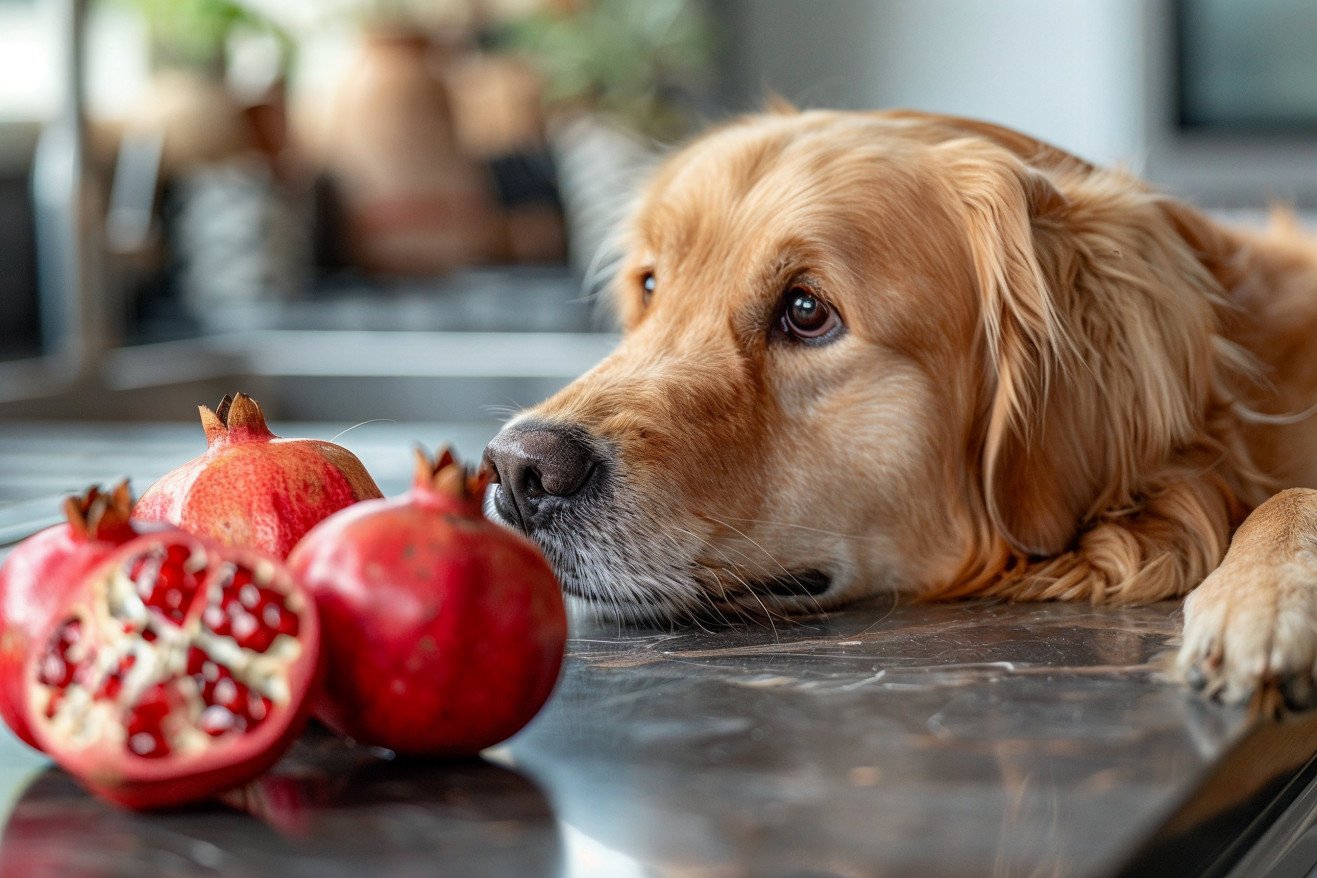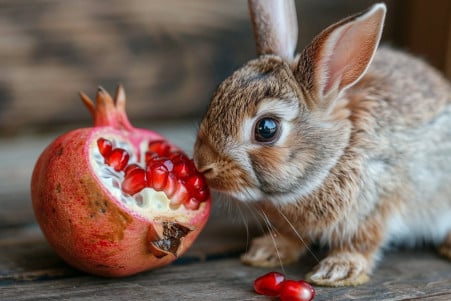Can Dogs Eat Pomegranate? Pros and Cons
26 May 2024 • Updated 25 May 2024

Pomegranates are packed with antioxidants and other nutrients that can be good for humans, but can your dog enjoy the same health benefits from this nutritious fruit? While pomegranates can be part of a healthy diet for dogs, there are some important things to keep in mind. For example, pomegranate seeds and the rind can be choking hazards and cause blockages in your dog’s intestines, so it’s best to only feed your dog the juicy arils. In addition, the tannins in pomegranates can cause digestive upset, including diarrhea, if your dog eats too much.
This article will use information from veterinarians, dog nutritionists, and research studies to explain whether pomegranates can be good for dogs. It will also discuss the precautions that dog owners need to take when feeding their pets this nutrient-rich fruit. By learning about the potential benefits and downsides, you can decide whether to give your dog pomegranate as an occasional snack.
Can dogs eat pomegranate?
Pomegranate Toxicity: What Parts of the Pomegranate Are Toxic to Dogs?
While the juicy arils are safe for dogs to eat in moderation, there are several parts of the pomegranate that are toxic to dogs. According to Dr. Cristine Hayes from the ASPCA Animal Poison Control Center, the leaves of the pomegranate plant are high in toxins that are poisonous to dogs.
The rind or skin of the pomegranate is also toxic to dogs because it is not easily digested and can cause a blockage in the intestines, as noted in a study on pomegranate peel digestibility in dogs. In addition to the risk of blockage, the rind’s tannin content is high and, while not toxic, can cause gastrointestinal upset, including vomiting and diarrhea.
The seeds are not toxic, according to Volhard Dog Nutrition, but they can be a choking hazard and cause irritation in the gut if eaten in large amounts due to their hard texture and indigestibility. If your dog eats any pomegranate leaves, rind, or an excessive amount of seeds, watch for signs of gastrointestinal upset, including vomiting, diarrhea, or constipation.
If you notice any of these symptoms, call your vet right away, as they could be a sign of poisoning or an intestinal blockage. To prevent these issues, make sure to remove all the seeds, rind, and leaves from the arils before giving them to your dog.
Are There Any Health Benefits to Dogs Eating Pomegranates?
Not only are pomegranates safe for dogs to eat in moderation, but they can also offer several health benefits. According to The Dog People by Rover.com, pomegranates are loaded with antioxidants and are a good source of fiber, potassium, folic acid, and vitamin C, all of which can help improve a dog's health.
A more recent study found that adding pomegranate peel extract to a dog's diet can improve their nutrient digestibility, hindgut metabolites, and antioxidant status. In addition, research has suggested that pomegranate extract can help improve a dog's heart health.
While raw pomegranate can lead to an upset stomach because of its tannin levels, pomegranate-based dog treats and supplements can help dogs get the nutritional benefits of pomegranates without the digestive issues. As Dr. Aziza Glass of Freshpet notes, these products are designed to deliver the advantages of pomegranate without causing stomach upset.
That said, it's always best to talk to a vet before giving a dog pomegranate, as they can help determine the right amount to give and keep an eye out for any negative side effects. And while pomegranates may have some health benefits, they should never be used to replace a dog's complete and balanced diet, according to Dr. Chyrle Bonk of PetKeen.com.
How to Feed Pomegranate to Your Dog
Because of the potential dangers of feeding pomegranate to dogs, it's important to be mindful of portion sizes and the frequency with which you introduce this fruit into your dog's diet. As Spot® notes, the high fiber and tannin content in pomegranate can lead to digestive issues, including vomiting and diarrhea, if dogs eat too much.
In general, ManyPets suggests that pomegranate should be considered an occasional treat for dogs, not a regular part of their diet. They also recommend only feeding dogs the arils (the juicy red flesh surrounding the seeds) and avoiding the seeds, skin, and leaves, which can be choking hazards and cause blockages.
TrustedHousesitters.com explains that while a few pomegranate seeds are unlikely to cause any problems for dogs, eating an entire pomegranate's worth of seeds can result in vomiting, diarrhea, and stomach pain. They also suggest calling a vet if you think your dog has eaten a lot of pomegranate.
To ensure that pomegranate is safe for your dog to eat, it's best to start with a very small amount and gradually increase the portion size while keeping an eye out for any negative reactions. This includes watching for signs of stomach upset, such as a loss of appetite, lethargy, or changes in bowel movements.
By being mindful of portion sizes and how often you feed pomegranate to your dog, you can make sure that they can enjoy the potential health benefits of this fruit as an occasional treat.
Making Pomegranate Dog Treats and Snacks
If you want to make your own pomegranate-based dog treats, you can do so in a way that is safe and healthy for your pet. According to the Rover.com recipe, the juicy arils can be mixed with oats and eggs to make crunchy, slightly sweet treats. For dogs that are sensitive to the tannins in fresh pomegranate, Health Extension recommends using pomegranate peel extract, which can deliver the same health benefits without the risk of digestive issues.
When making your own pomegranate treats, it's important to make sure that you don't include the seeds, peel, or rind, as these can be choking hazards and cause obstructions. The Wag the Dog UK recipe mixes pomegranate molasses with salmon to make a delicious, nutritious treat. Or, you can try Raising Your Pets Naturally’s pomegranate and butternut squash pie, which is safe for dogs, cats, and other animals.
No matter which recipe you choose, be sure to introduce new treats slowly and watch your dog for signs of digestive issues or other problems. If you’re careful and a little bit creative, you can make sure that your dog gets the benefits of pomegranate in their treat rotation.
Conclusion: Pomegranates Can Be an Occasional Treat for Dogs
In conclusion, pomegranates can be a safe and potentially helpful occasional treat for dogs, but they should be used with caution and in moderation. Only the arils should be fed to dogs since the skin, seeds, leaves, and flowers of the pomegranate plant can be harmful.
Pomegranates should not be used as a substitute for a dog's complete and balanced diet, and it's best to ask your vet for advice before adding them to your dog's diet. If you take the necessary precautions, you can give your dog the nutritional benefits of pomegranates as a supplement to their diet.


